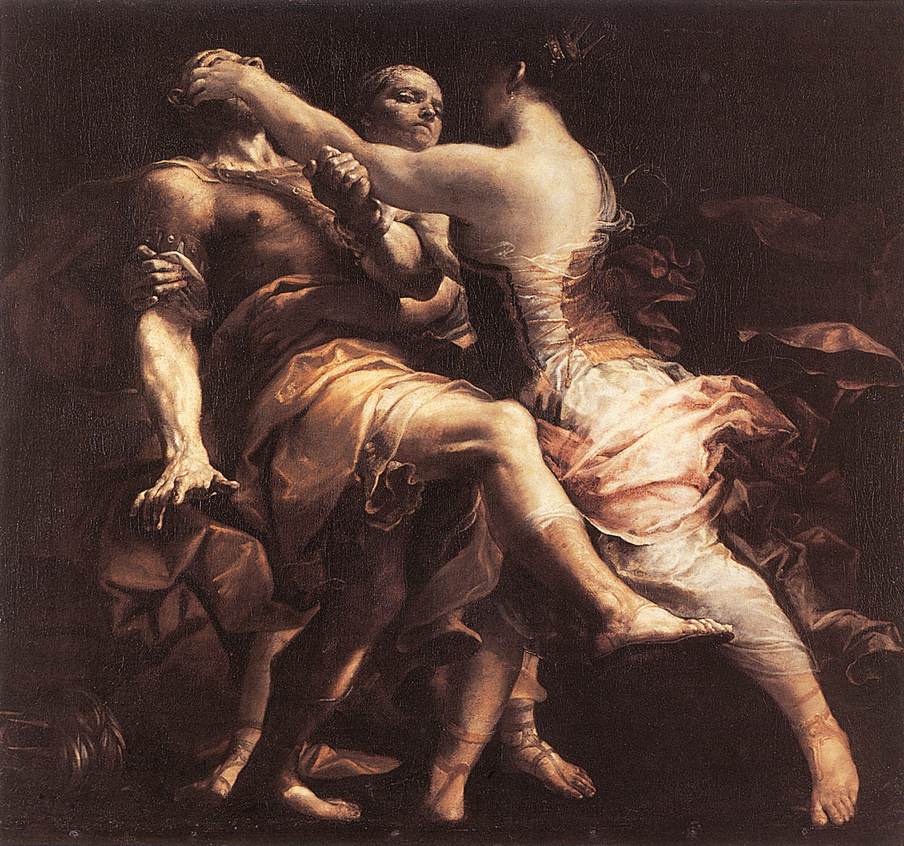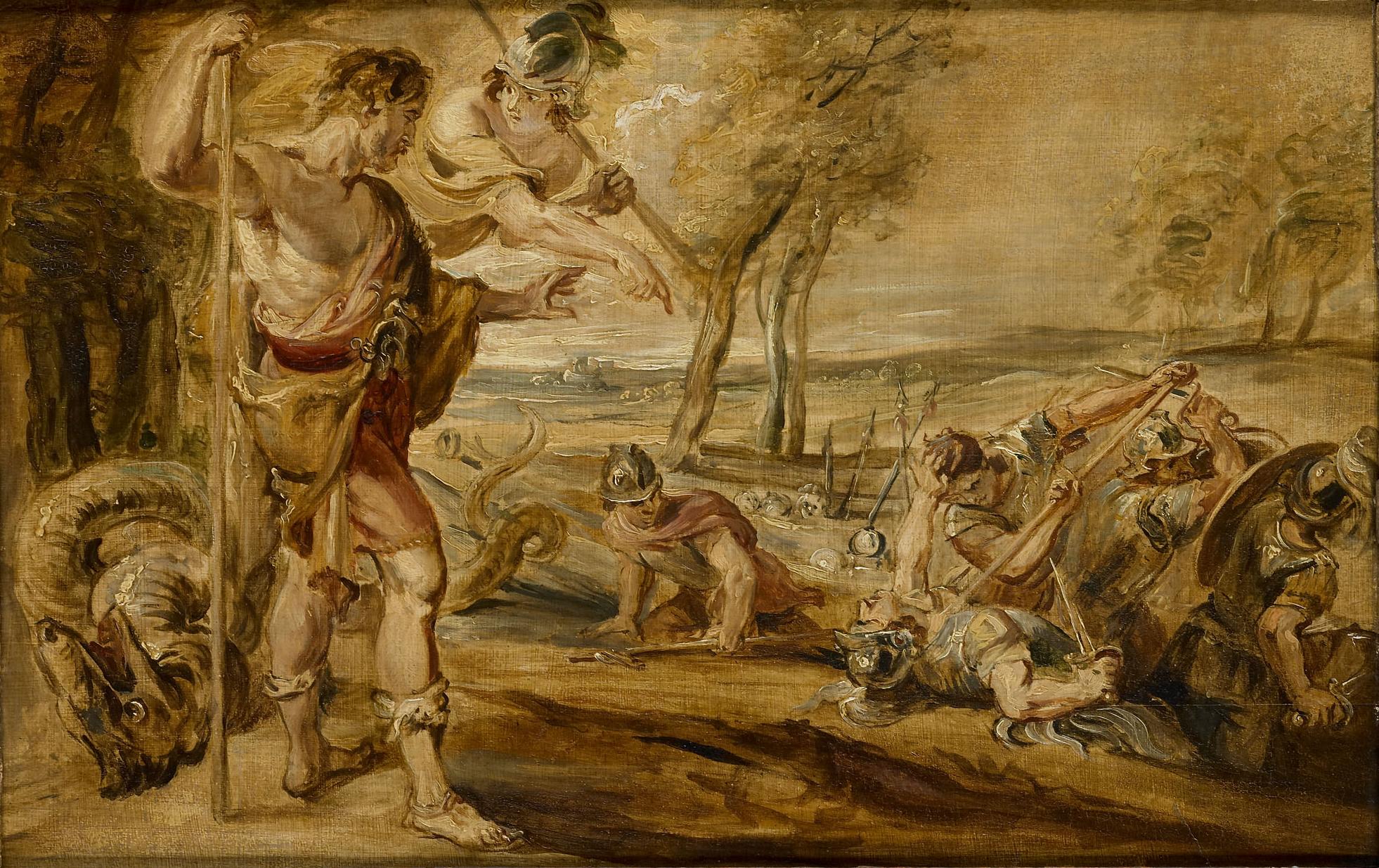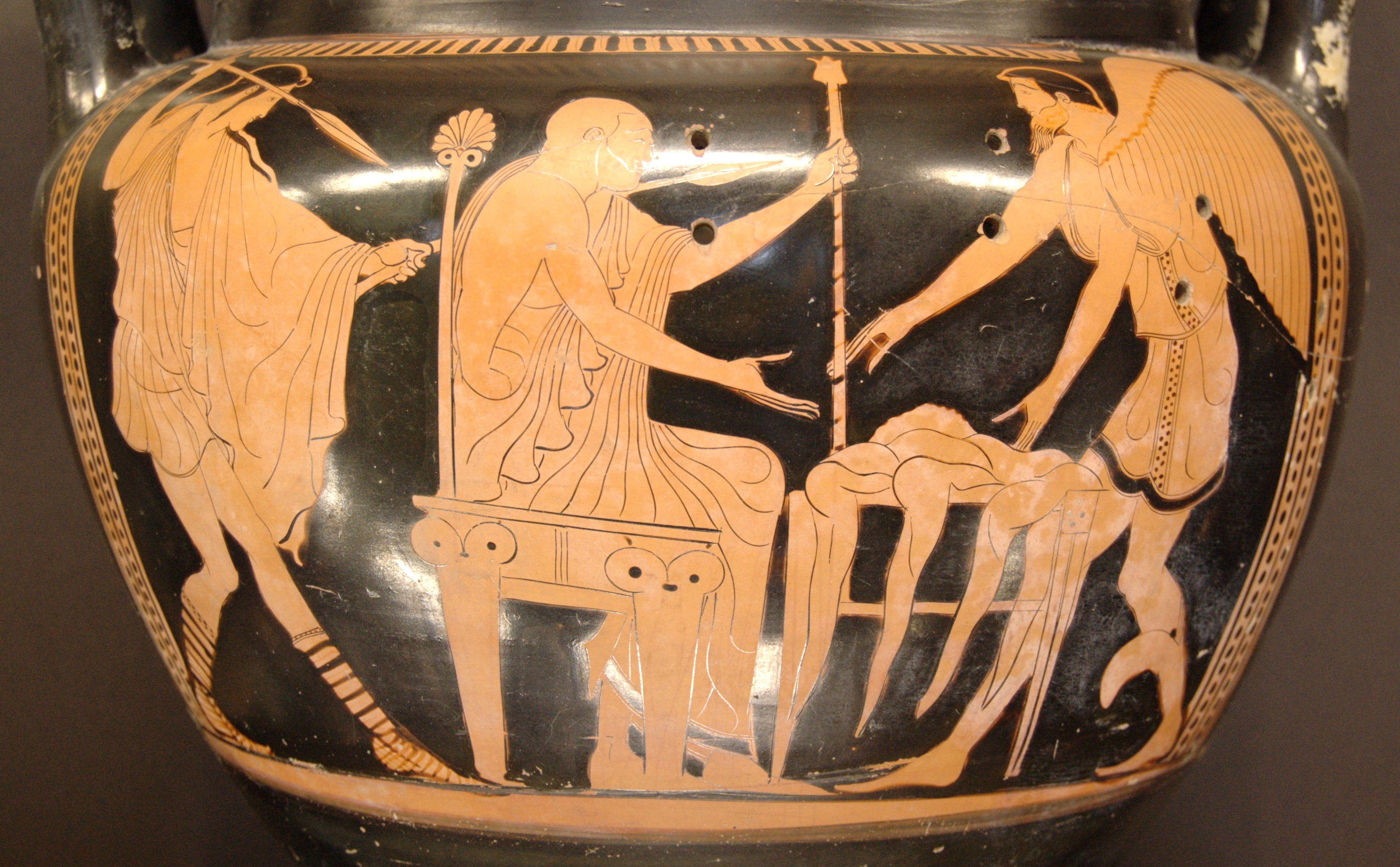|
Polydorus
In Greek mythology, Polydorus (; , i.e. "many-gift d) or Polydoros referred to several different people. *Polydorus, son of Phineus and Cleopatra, and brother of Polydector (Polydectus). These two sons by his first wife were blinded by Phineus because of the instigation of their stepmother, Idaea, who accused them of corrupting her virtue. * Prince Polydorus, son of the King Cadmus and goddess Harmonia, fathered Labdacus by his wife Nycteis. *Polydorus, an Argive, son of Hippomedon and Euanippe, daughter of Elatus. Pausanias lists him as one of the Epigoni, who attacked Thebes in retaliation for the deaths of their fathers, the Seven against Thebes, who died attempting the same thing. * Prince Polydorus, a Trojan, was King Priam's youngest son. *Polydorus, a Ceteian warrior who participated in the Trojan War. During the siege of Troy, he was killed by Odysseus using his sword along with Aenus, another Ceteian. (Ceteius is called a stream in Asia Minor). * Polydorus (s ... [...More Info...] [...Related Items...] OR: [Wikipedia] [Google] [Baidu] |
Polydorus Of Troy
Polydorus or Polydoros (; , i.e. "many-gift d) is the youngest son of Priam in the mythology of the Trojan War. While Homer states his mother is Laothoe, later sources state his mother is Hecuba. Polydorus is an example of the fluid nature of myth, as his role and story vary significantly in different traditions and sources. Mythology In the ''Iliad'' In Homer's Greek epic the ''Iliad'', Polydorus is depicted briefly as a foe to Achilles. According to this source, Polydorus was the youngest son of Priam, and thus his father would not let him fight. Achilles, however, sees him on the battlefield showing off his great speed running through the lines and spears him, ending his life. Seeing his brother Polydorus' death causes Hector to challenge Achilles. In ''Hecuba'' and ''Metamorphoses'' In Euripides' tragedy ''Hecuba'', the ghost of Polydorus is a character, and his death is the cause of the main conflict of the play. Polydorus' ghost presents the prologue of the pla ... [...More Info...] [...Related Items...] OR: [Wikipedia] [Google] [Baidu] |
Polydorus (son Of Cadmus)
In Greek mythology, Polydorus or Polydoros (; means 'many-gift d) was a king of Thebes. Family Polydorus was the youngest and only male child of Cadmus and Harmonia, his sisters were Autonoë, Ino, Agave and Semele. He was the father of Labdacus by Nycteïs, the daughter of Nycteus. Mythology Upon the death of Cadmus, Pentheus, the son of Echion and Agave, after banishing Polydorus ruled Thebes for a short time until Dionysus prompted Agave to kill Pentheus. Polydorus then succeeded Pentheus as king of Thebes and married Nycteïs. When their son Labdacus was still young, Polydorus died of unknown causes, entrusting his father-in-law Nycteus to care the infant prince and to be his regent. In Pausanias's history, Polydorus' rule began when his father abdicated the throne and together with his mother Harmonia migrated to the Illyrian tribe of the Enchelii, but this is the only source for such a timeline. It is also said that along with the thunderbolt hurled at t ... [...More Info...] [...Related Items...] OR: [Wikipedia] [Google] [Baidu] |
Cadmus
In Greek mythology, Cadmus (; ) was the legendary Phoenician founder of Boeotian Thebes, Greece, Thebes. He was, alongside Perseus and Bellerophon, the greatest hero and slayer of monsters before the days of Heracles. Commonly stated to be a prince of Phoenicia, the son of king Agenor and queen Telephassa of Tyre, Lebanon, Tyre, the brother of Phoenix (son of Agenor), Phoenix, Cilix and Europa (consort of Zeus), Europa, Cadmus traced his origins back to Poseidon and Libya of Egypt, Libya. Originally, he was sent by his royal parents to seek out and escort his sister Europa back to Tyre after she was abducted from the shores of Phoenicia by Zeus. In early accounts, Cadmus and Europa were instead the children of Phoenix (son of Agenor), Phoenix.Scholia on Homer, ''Iliad'' B, 494, p. 80, 43 ed. Bekk. as cited in Hellanicus of Lesbos, Hellanicus' ''Boeotica'' Cadmus founded or refounded the Greek city of Ancient Thebes (Boeotia), Thebes, the acropolis of which was originally named ... [...More Info...] [...Related Items...] OR: [Wikipedia] [Google] [Baidu] |
Harmonia (mythology)
In Greek mythology, Harmonia (; / harmoˈnia/, "harmony", "agreement") is the goddess of harmony and concord. Her Greek opposite is Eris and her Roman counterpart is Concordia. Harmonia is most well-known for her marriage to Cadmus and the many misfortunes that haunted her descendants, particularly those related to the fabled Necklace of Harmonia. Family Harmonia's parentage varies between accounts. She has most often been named as a daughter of the gods Ares and Aphrodite. Scholia on Homer, ''Iliad'' B, 494, p. 80, 43 ed. Bekk. as cited in Hellanicus' ''Boeotica'' Apollodorus3.4/ref> This would make her the sister of other mythological figures such as Aeneas, Phobos, and Eros. In other accounts, Harmonia was born in Samothrace to Zeus and the Pleiad Electra. In this telling, Harmonia would have been the sister of Dardanus and Iasion, who, under the instruction of Zeus, were the founders of mystic rites on Samothrace.Diodorus Siculus5.48.2/ref> Almost always, ... [...More Info...] [...Related Items...] OR: [Wikipedia] [Google] [Baidu] |
Priam
In Greek mythology, Priam (; , ) was the legendary and last king of Troy during the Trojan War. He was the son of Laomedon. His many children included notable characters such as Hector, Paris, and Cassandra. Etymology Most scholars take the etymology of the name from the Luwian 𒉺𒊑𒀀𒈬𒀀 (Pa-ri-a-mu-a-, or “exceptionally courageous”), attested as the name of a man from Zazlippa, in Kizzuwatna. A similar form is attested transcribed in Greek as ''Paramoas'' near Kaisareia in Cappadocia. Some have identified Priam with the historical figure of Piyama-Radu, a warlord active in the vicinity of Wilusa. However, this identification is disputed, and is highly unlikely, given that he was known in Hittite records as being an ally of the Ahhiyawa against Wilusa. A popular folk etymology derives the name from the Greek verb , meaning 'to buy'. This in turn gives rise to a story of Priam's sister Hesione ransoming his freedom with a veil, from Heracles, thereby 'buying ... [...More Info...] [...Related Items...] OR: [Wikipedia] [Google] [Baidu] |
Labdacus
In Greek mythology, Labdacus (, ''Lábdakos'') was the only son of Polydorus and a king of Thebes. Labdacus was a grandson of Thebes' founder, Cadmus. His mother was Nycteïs, daughter of Nycteus. Mythology Polydorus died while Labdacus was a child, leaving Nycteus as his regent, although Lycus soon replaced him in that office. When Labdacus had grown, he briefly ruled Thebes. He died while he was still young, after he lost a war with the king of Athens, Pandion, over their borders. Apollodorus writes that he, like his cousin Pentheus, was ripped apart by women in a bacchic frenzy for disrespect to the god Dionysus.'' Bibliotheca'' 3.5.5. Lycus became regent once more after his death, this time for Labdacus' son, Laius. His descendants were called the ''Labdacids'', and included his son Laius, who fathered Oedipus; Oedipus' children were Polynices, Eteocles In Greek mythology, Eteocles (; ) was a king of Ancient Thebes (Boeotia), Thebes, the son of Oedipus and ei ... [...More Info...] [...Related Items...] OR: [Wikipedia] [Google] [Baidu] |
Polydorus (son Of Astyanax)
In Greek mythology, Polydorus or Polydore ( /ˌpɒlɪˈdɔːrəs/; Ancient Greek: Πολύδωρος, i.e. "many-gift d) was the son of Astyanax, prince of Troy. Astyanax was killed by either Neoptolemos (Achilles' son) or by Odysseus. According to another legend, Astyanax was brought to Greece by Neoptolemos. In Frankish legend, Polydore was an ancestor of Clovis I, Peppin III and Charlemagne Charlemagne ( ; 2 April 748 – 28 January 814) was List of Frankish kings, King of the Franks from 768, List of kings of the Lombards, King of the Lombards from 774, and Holy Roman Emperor, Emperor of what is now known as the Carolingian .... Note Trojans Heracleidae {{Greek-myth-stub ... [...More Info...] [...Related Items...] OR: [Wikipedia] [Google] [Baidu] |
Epigoni
In Greek mythology, the Epigoni or Epigonoi (; from , meaning "offspring") are the sons of the Argive heroes, the Seven against Thebes, who had fought and been killed in the first Theban war, the subject of the ''Thebaid'', in which Polynices and his allies attacked Thebes because Polynices' brother, Eteocles, refused to give up the throne as promised. The second Theban war, also called the war of the Epigoni, occurred ten years later, when the Epigoni, wishing to avenge the death of their fathers, attacked Thebes. List of Epigoni According to the mythographer Apollodorus, they were: * Aegialeus, son of Adrastus * Alcmaeon, son of Amphiaraus * Amphilochus, son of Amphiaraus * Diomedes, son of Tydeus * Euryalus, son of Mecisteus * Promachus, son of Parthenopaeus * Sthenelus, son of Capaneus * Thersander, son of Polynices To this list, the geographer Pausanias also adds: * Polydorus, son of Hippomedon * Adrastus and Timeas, sons of Polynices Hyginus also makes note of ... [...More Info...] [...Related Items...] OR: [Wikipedia] [Google] [Baidu] |
Nycteïs
In Greek mythology, Nycteis (Ancient Greek: Νυκτηίς means "daughter of night") was the daughter of Nycteus and Polyxo. She married the son of Cadmus and Harmonia, Polydorus, a Theban king and mother by him of Labdacus, king of Thebes.Apollodorus, 3.5.5 Notes References * Apollodorus Apollodorus ( Greek: Ἀπολλόδωρος ''Apollodoros'') was a popular name in ancient Greece. It is the masculine gender of a noun compounded from Apollo, the deity, and doron, "gift"; that is, "Gift of Apollo." It may refer to: :''Note: A ..., ''The Library'' with an English Translation by Sir James George Frazer, F.B.A., F.R.S. in 2 Volumes, Cambridge, MA, Harvard University Press; London, William Heinemann Ltd. 1921. ISBN 0-674-99135-4Online version at the Perseus Digital Library. [...More Info...] [...Related Items...] OR: [Wikipedia] [Google] [Baidu] |
Trojan War
The Trojan War was a legendary conflict in Greek mythology that took place around the twelfth or thirteenth century BC. The war was waged by the Achaeans (Homer), Achaeans (Ancient Greece, Greeks) against the city of Troy after Paris (mythology), Paris of Troy took Helen of Troy, Helen from her husband Menelaus, king of Sparta. The war is one of the most important events in Greek mythology, and it has been Epic Cycle, narrated through many works of ancient Greek literature, Greek literature, most notably Homer's ''Iliad''. The core of the ''Iliad'' (Books II – XXIII) describes a period of four days and two nights in the tenth year of the decade-long siege of Troy; the ''Odyssey'' describes the journey home of Odysseus, one of the war's heroes. Other parts of the war are described in a Epic Cycle, cycle of epic poems, which have survived through fragments. Episodes from the war provided material for Greek tragedy and other works of Greek literature, and for Latin literature, ... [...More Info...] [...Related Items...] OR: [Wikipedia] [Google] [Baidu] |
Phineus
In Greek mythology, Phineus (; ), was a king of Salmydessus in Thrace and seer, who appears in accounts of the Argonauts' voyage. Some accounts make him a king in PaphlagoniaScholia on Apollonius of Rhodes, 2.178, 237; Scholia ''ad eund'' 2.177; Eustathius ad Homer, ''Iliad'2.851 ad Dionysius Periegetes, 787; Stephanus of Byzantium, s.v.; Constantine Porphyrogennetos, ''De thematibus'' 1.7; William Smith, '' Dictionary of Greek and Roman Geography'' s.v. Paphlagonia' or in Arcadia. Family Several different versions of Phineus's parentage were presented in ancient texts. According to Apollonius of Rhodes, he was a son of Agenor, but the '' Bibliotheca'' says that other authors named his father as Poseidon (who is the father of Agenor).Apollodorus1.9.21/ref> The Hesiodic ''Catalogue of Women'', on the other hand, reported that Phineus was the son of Phoenix and Cassiopeia. His first wife was Cleopatra, daughter of Boreas and Oreithyia, by whom he had a pair of son ... [...More Info...] [...Related Items...] OR: [Wikipedia] [Google] [Baidu] |
Aenus (mythology)
In Greek mythology, Aenus (Ancient Greek: Αἶνον) a Ceteian soldier who participated in the Trojan War. During the siege of Troy, he was slain by Odysseus using his spear along with Polydorus, another Ceteian.Quintus Smyrnaeus11.79/ref> His name means 'dread, dire, grim, horrible' or 'tale, story'. Note References * Quintus Smyrnaeus Quintus Smyrnaeus (also Quintus of Smyrna; , ''Kointos Smyrnaios'') was a Greek epic poet whose ''Posthomerica'', following "after Homer", continues the narration of the Trojan War. The dates of Quintus Smyrnaeus' life and poetry are disputed: by ..., '' The Fall of Troy'' translated by Way. A. S. Loeb Classical Library Volume 19. London: William Heinemann, 1913Online version at theio.com* Quintus Smyrnaeus, ''The Fall of Troy''. Arthur S. Way. London: William Heinemann; New York: G.P. Putnam's Sons. 1913Greek text available at the Perseus Digital Library {{Greek-myth-stub Characters in Greek mythology ... [...More Info...] [...Related Items...] OR: [Wikipedia] [Google] [Baidu] |





